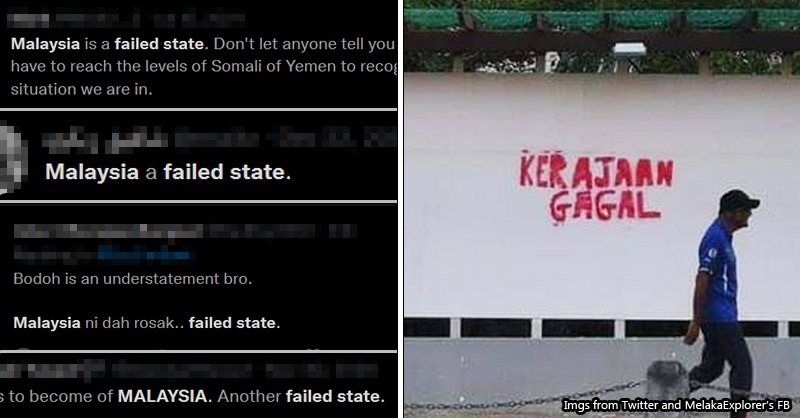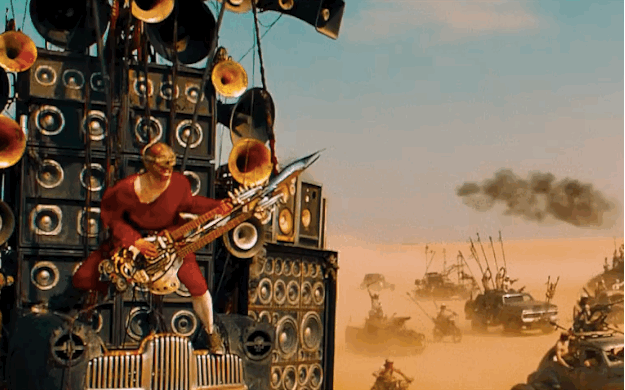People have been saying that Malaysia is a failed state… but what does that even mean?

- 295Shares
- Facebook274
- Twitter3
- LinkedIn1
- Email2
- WhatsApp15
Lately, there’s been a lot of unsavory news about the Malaysian government, and whenever such news come up, it’s not uncommon to see people commenting something along the lines of
“Aiyo, Malaysia is becoming a failed state!” – some passionate uncle in the comments section.
We can maybe attribute the popularity of the term from mid-last year, when a Bloomberg opinion piece by Daniel Moss titled “Malaysia Is Staggering Down the Road to Failed Statehood“ caused an uproar among both the government and its critics. Or maybe it was veteran politician Lim Kit Siang, who had been warning that Malaysia is becoming a failed state for quite some time already.
Regardless of how it became a trend, we can probably agree that Malaysia’s not really a failed state yet – or is it?
Let’s look at that topic today, starting with a question…
Actually, how can you tell when a state is a “failed state”?

If we’re being technical about it, we should mention that there’s no clear, agreed upon definition of what a failed state is. Encyclopedia Britannica defines a failed state as one that’s unable to do two basic things: have authority over its territory and people, and protect its national boundaries. In other words, if neither the citizens nor the international community acknowledge the state as legitimate, it’s a failed state
The Crisis States Research Centre (CSRC), on the other hand, defines a failed state as when the state is unable to ‘perform basic security, development functions, and has no effective control over its territory and borders’. Another, simpler definition comes from an article from The Economist, which puts a failed state as one that cannot provide security to its citizens, a basic state responsibility.
From these three definitions, we can perhaps say that a failed state is one where the government has little or no power over the country, and as such cannot govern the state. So using this definition, Malaysia most probably isn’t a failed state – just a failing one if we’re being pessimistic about it. There’s a tendency to label poorly performing states as failed states, and although many states can be said to be weak or failing, very few states can be described as completely failed or collapsed.

So how close is Malaysia to being a failed state then? Well, it’s hard to tell exactly when a state goes from ‘failing’ to ‘failed’. The Economist, using Nigeria as an example, mentioned that while they seem to be failing, it holds together – but barely.
“Elections are dirty and violent, but more or less reflect the will of the people. Government is corrupt, but most Nigerians recognise it. When especially angry, many Nigerians describe their country as a failure. But it does not really deserve that label.” – excerpt from The Economist, September 2021.
Some had tried to come up with more quantifiable ways to determine how close a state is to failing, one of them being the Failed States Index (FSI). Countries are scored on several aspects – like human rights, brain drain, and state legitimacy, among others – and they are ranked from most stable to most vulnerable to collapsing. However, a state’s stability is a bit more complex than that: each individual states’ history, culture, current challenges, and other factors need to be taken into account as well.
For example, despite several government changes and all the crap we’ve been through these past few years, Malaysia’s FSI score had been dropping, suggesting that we’re becoming more stable.

The bottom line here is that while we vaguely know what a failed state is like, we don’t have an accurate way to say how close we are to being one. We know at least that Malaysia isn’t really a failed state, but…
Some descriptions of failed states sound a bit too familiar
As we’ve mentioned earlier, after the Bloomberg article that called Malaysia a failed state came out, both the government and its critics got offended and rebuked the opinion, a move that we now know is justified. We’re not a failed state, whatever that means, but reading some of the descriptions of failed states in Rotberg’s book on state failures, we get why some would think that.
“If legislatures exist at all, they are rubber-stamping machines. Democratic debate is noticeably absent.”
“The judiciary is derivative of the executive rather than being independent, and citizens know that they cannot rely on the court system for significant redress or remedy, especially against the state.”
“The bureaucracy has long ago lost its sense of professional responsibility and exists solely to carry out the orders of the executive and, in petty ways, to oppress citizens.”
“Failed states offer unparalleled economic opportunity—but only for a privileged few. Those around the ruler or the ruling oligarchy grow richer while their less fortunate brethren starve … the privilege of making real money when everything else is deteriorating is confined to clients of the ruling elite or to especially favored external entrepreneurs.”
So while we can take solace in the fact that we haven’t completely failed yet, we still need to address this perception that we are a failed state, before it becomes a reality.
- 295Shares
- Facebook274
- Twitter3
- LinkedIn1
- Email2
- WhatsApp15
